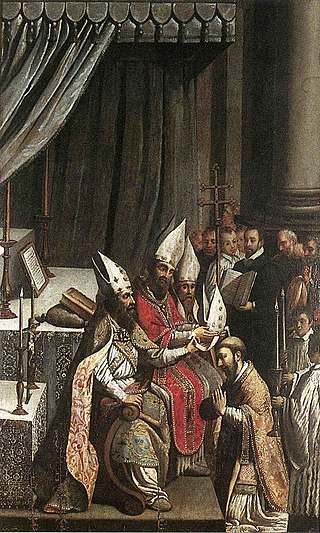
Apostolic succession is the method whereby the ministry of the Christian Church is considered by some Christian denominations to be derived from the apostles by a continuous succession, which has usually been associated with a claim that the succession is through a series of bishops. Those of the Catholic, Eastern Orthodox, Anglican, Church of Sweden, Oriental Orthodox, Church of the East, Hussite, Moravian and Old Catholic traditions maintain that "a bishop cannot have regular or valid orders unless he has been consecrated in this apostolic succession". These traditions do not always consider the episcopal consecrations of all of the other traditions as valid.
A bishop is an ordained member of the clergy who is entrusted with a position of authority and oversight in a religious institution. In Christianity, bishops are normally responsible for the governance and administration of dioceses. The role or office of the bishop is called episcopacy. Organizationally, several Christian denominations utilize ecclesiastical structures that call for the position of bishops, while other denominations have dispensed with this office, seeing it as a symbol of power. Bishops have also exercised political authority within their dioceses.

An episcopal polity is a hierarchical form of church governance in which the chief local authorities are called bishops. The word "bishop" here is derived via the British Latin and Vulgar Latin term *ebiscopus/*biscopus, from the Ancient Greek ἐπίσκοπος epískopos meaning "overseer". It is the structure used by many of the major Christian Churches and denominations, such as the Catholic, Eastern Orthodox, Oriental Orthodox, Church of the East, Anglican, Lutheran and Methodist churches or denominations, and other churches founded independently from these lineages.
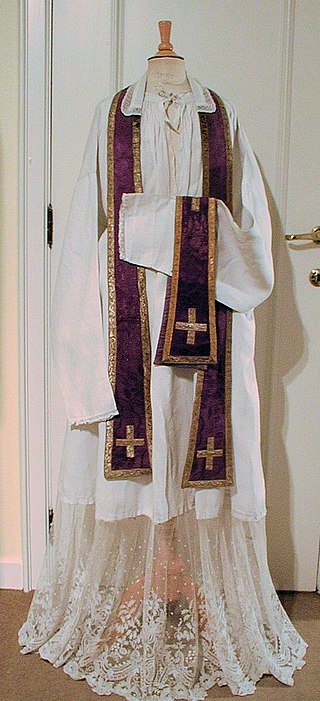
The stole is a liturgical vestment of various Christian denominations, which symbolizes priestly authority; in Protestant denominations which do not have priests but use stoles as a liturgical vestment, however, it symbolizes being a member of the ordained. It consists of a band of colored cloth, usually of silk, about seven and a half to nine feet long and three to four inches wide, whose ends may be straight or may broaden out in the shape of a spade or bell. The center of the stole is worn around the back of the neck and the two ends hang down parallel to each other in front, either attached to each other or hanging loose. The stole is almost always decorated in some way, usually with two crosses, or sometimes another significant religious design. It is often decorated with contrasting galloons and fringe is usually applied to the ends of the stole following Numbers 15:38–39. A piece of white linen or lace may be stitched onto the back of the collar as a sweat guard, which can be replaced more cheaply than the stole itself.
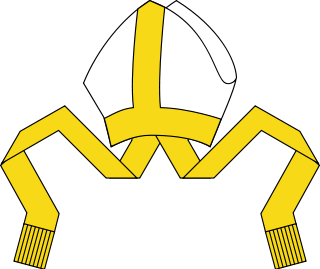
John Stephen Cummins is an American prelate of the Roman Catholic Church. He served as bishop of the Diocese of Oakland in California from 1977 to 2003 and as an auxiliary bishop of the Diocese of Sacramento in California from 1974 to 1977.

Trinity School for Ministry (TSM), formerly known as Trinity Episcopal School for Ministry, is an Anglican seminary in Ambridge, Pennsylvania. It is generally associated with evangelical Anglicanism.
The Holy Catholic Church, Anglican Rite Jurisdiction of the Americas (ARJA) was an Anglican traditionalist church originating in 1981 from within the Anglican Catholic Church (ACC) in the United States and with the assistance of the Philippine Independent Catholic Church (PICC), an offshoot of the mainline Philippine Independent Church. Citing political infighting within the Anglican Catholic Church, four of its clergy sought the help of the Philippine church in consecrating them to be bishops of a daughter province in which each of them would serve as bishop ordinary of a diocese covering one-quarter of the United States.
The Charismatic Episcopal Church (CEC), officially the International Communion of the Charismatic Episcopal Church (ICCEC), is a Christian denomination established in 1992. The ICCEC is a part of the Convergence Movement. Within North America, most of the Charismatic Episcopal Church's congregations and missions are located within the Northern, Southeastern, Midwest, and Western United States; it also has a presence in Texas, and in Western Canada.

Randolph Roque Calvo is an America prelate of the Roman Catholic Church. Calvo served as the seventh bishop of the Diocese of Reno in Nevada from 2006 until 2021
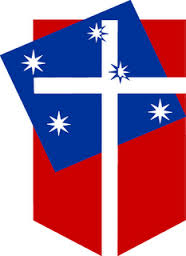
The Anglican Episcopal Church of Brazil is the 19th province of the Anglican Communion, covering the country of Brazil. It is composed of nine dioceses and one missionary district, each headed by a bishop, among whom one is elected as the Primate of Brazil. The current Primate is Marinez Rosa dos Santos Bassotto. IEAB is the oldest non-Catholic church in Brazil, originating from the Treaty of Commerce and Navigation signed in 1810 between Portugal and the United Kingdom which allowed the Church of England to establish chapels in the former Portuguese colony. In 1890 American missionaries from the Episcopal Church established themselves in the country aiming to create a national church; unlike the English chapels, they celebrated services in Portuguese and converted Brazilians. The Anglican community of Brazil was a missionary district of the Episcopal Church until 1965, when it gained its ecclesiastical independence and became a separate province of the Anglican Communion. Twenty years later, IEAB began to ordain women. It preaches a social gospel, being known for its commitment to fight against problems that affect vast portions of the Brazilian society, such as social inequality, land concentration, domestic violence, racism, homophobia and xenophobia. Its stance as an Inclusive Church has caused both schisms and the arrival of former Catholics and Evangelicals in search of acceptance.
The African Orthodox Church (AOC), is a predominantly African-American Christian denomination which was founded in the United States in 1918 by the joint collaboration of its first patriarch, George Alexander McGuire, and Marcus M. Garvey.
The Convergence Movement, also known as the Ancient-Future Faith, whose foundation is primarily attributed to Robert E. Webber in 1985, is an ecumenical movement. Developed as an effort among evangelical, charismatic and Pentecostal, and liturgical Christians and denominations blending their forms of worship, the movement has been defined for its predominant use of the Anglican tradition's Book of Common Prayer; use from additional liturgical sources common to Lutheranism, Eastern Orthodoxy, and Catholicism have also been employed.
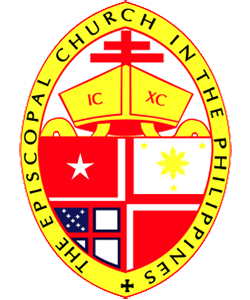
The Episcopal Church in the Philippines is a province of the Anglican Communion comprising the country of the Philippines. It was established by the Episcopal Church of the United States in 1901 by American missionaries led by Charles Henry Brent, who served as the first resident bishop, when the Philippines was opened to Protestant American missionaries. It became an autonomous province of the Anglican Communion on May 1, 1990.
Christian universalism is a school of Christian theology focused around the doctrine of universal reconciliation – the view that all human beings will ultimately be saved and restored to a right relationship with God. "Christian universalism" and "the belief or hope in the universal reconciliation through Christ" can be understood as synonyms. Opponents of this school, who hold that eternal damnation is the ultimate fate of some or most people, are sometimes called "infernalists."
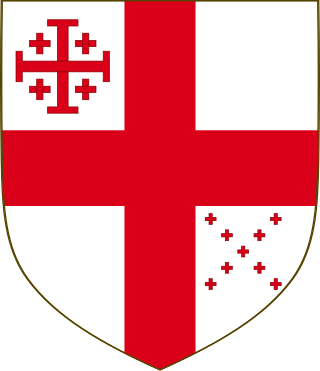
The United Episcopal Church of North America (UECNA) is a church in the Anglican tradition and is part of the Continuing Anglican movement. It is not part of the Anglican Communion.
The Communion of Evangelical Episcopal Churches (CEEC) is a Christian convergence communion established in 1995 within the United States of America. With a large international presence in five provinces and seven U.S. dioceses, most of its churches and missions are spread throughout the Mid-Atlantic and Mid-West regions, and South Carolina; Florida and California; and India. The Communion of Evangelical Episcopal Churches is currently led by Bishop Quintin Moore as presiding bishop of the CEEC.
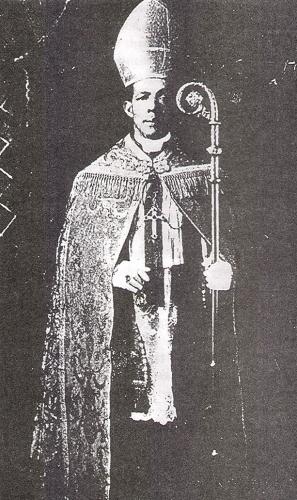
George Alexander McGuire was the founder of the African Orthodox Church, and a prominent member of Marcus Garvey's Universal Negro Improvement Association (UNIA).
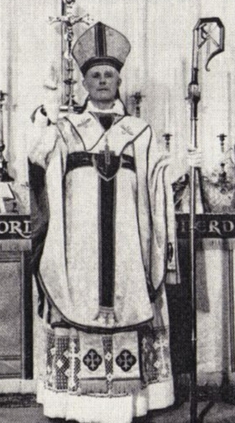
Hugh George de Willmott Newman was an Independent Catholic or independent Old Catholic bishop. He was known religiously as Mar Georgius I and bore the titles, among others, of Patriarch of Glastonbury, Catholicos of the West, and sixth British Patriarch. He was the head of the Catholicate of the West from when he became a bishop, in 1944, until his death in 1979.
Historically, Portland has been a religious city. In modern times, however, it has become the least religious city in the United States.










